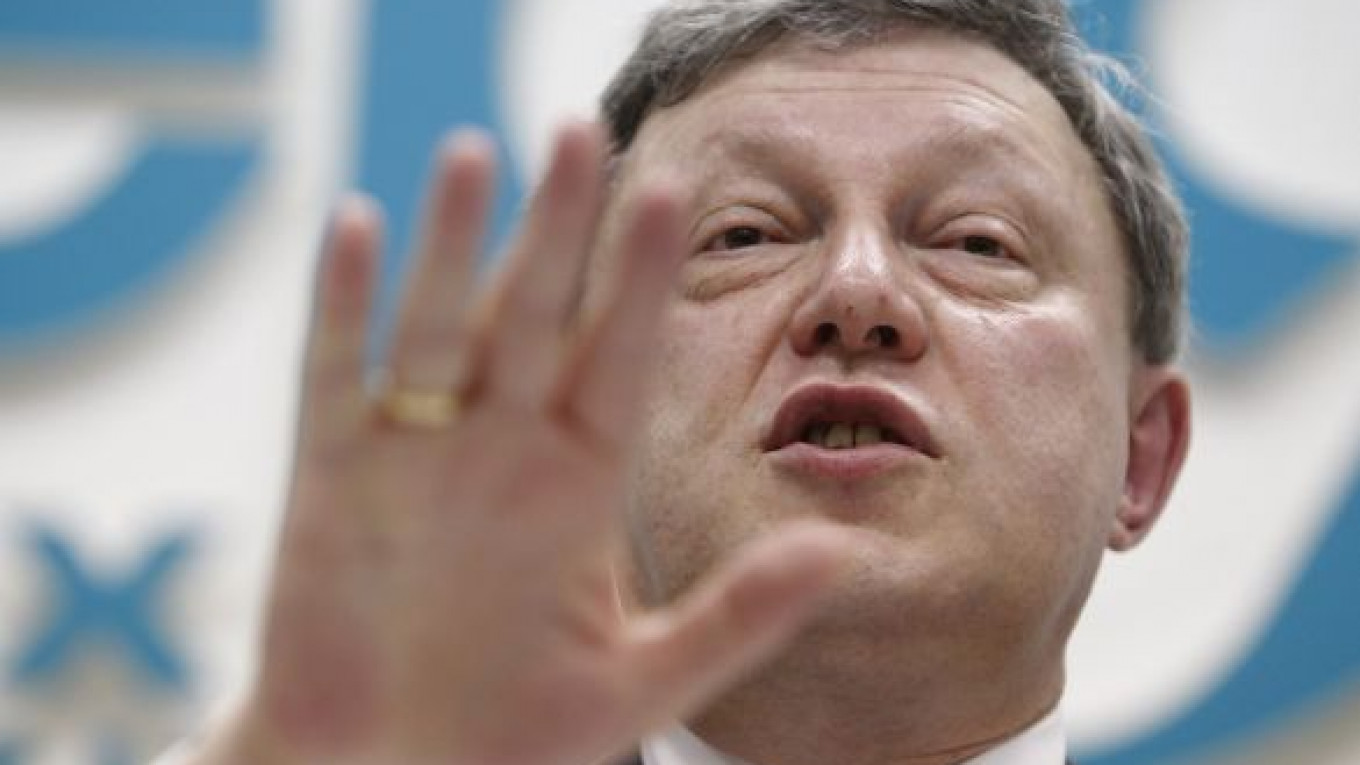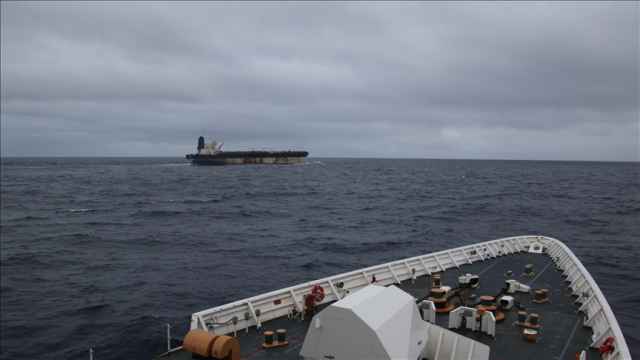Liberal stalwart Grigory Yavlinsky faces exclusion from the March 4 presidential election after many signatures submitted to register his candidacy were ruled inadmissible by the Central Elections Commission.
Yavlinsky, with support of about 1 percent, poses no threat to Prime Minister Vladimir Putin, who is expected to win the election, and his Yabloko party said his problems looked like revenge for the role that Yabloko election monitors played in exposing violations in last month's State Duma elections.
The Central Elections Commission, however, confirmed that another independent candidate, billionaire Mikhail Prokhorov, was well on his way toward winning a spot on the presidential ballot after only a few errors were found in a sampling of the signatures he submitted.
Commission secretary Nikolai Konkin said Monday that an initial check had disqualified about 23 percent of Yavlinsky's more than 2 million signatures, including 79,000 allegedly photocopied signatures.
An additional check will be carried out on the signatures, and if more than 5 percent are determined to be false, or if the final tally minus the inadmissible signatures is less than the required 2 million signatures, Yavlinsky will be excluded from the contest.
A final ruling on Yavlinsky's eligibility will be made by Jan. 29, Konkin said.
Yabloko spokesman Igor Yakovlev insisted that the 2,086,000 signatures submitted on Yavlinsky's behalf were real.
"We're ready to fight the decision in court," he said, adding that he expected the commission to make its decision on Yavlinsky's candidacy as early as Wednesday.
Yavlinsky warned that his exclusion would signal that the election had been rigged. "This isn't about me or about Yabloko but about the elections. A rejection means the elections are closed. But we will fight," Yavlinsky wrote on his Twitter microblog.
Presidential hopefuls without political representation in the State Duma must run as independents and are given about six weeks to gather signatures from supporters. Yabloko mobilized more than 10,000 volunteers in 10 European countries for the effort.
But critics have complained that it is physically impossible to gather the signatures in the time allotted and that the rule exists as a pretext for excluding candidates. Assuming that a candidate needs to gather 2.2 million signatures — a 10 percent cushion for invalid signatures — and the average volunteer can gather 50 signatures per day, each candidate needs more than 1,000 volunteers working every day for six weeks.
Speculation swirled Monday as to why the Kremlin might want to derail Yavlinsky, whose 1 percent popularity is dwarfed by Putin's 45 percent, according to a Jan. 14-15 poll by government pollster VTsIOM. Yabloko leader Sergei Mitrokhin pointed to the uproar caused by alleged fraud during Dec. 4 Duma elections. "The main reason … is our observers. They're the ones who raised hell on Dec. 4., and Putin doesn't want a repeat on March 4," he wrote on Twitter.
Without Yavlinsky's candidacy, Yabloko representatives would not be able to serve as election monitors on March 4, reducing the number of opposition-minded observers at polling stations, said Grigory Melkonyants, deputy head of Golos, the country's only independent elections watchdog.
Melkonyants also said the Kremlin might want to eliminate presidential candidates to ensure that Putin wins at least 50 percent of the vote, which would allow him to avoid a potentially embarrassing second round of voting.
Election observers were largely responsible for documenting instances of alleged vote-rigging during the Duma elections. The perception that the elections were dirty drew tens of thousands onto the streets nationwide, most dramatically in two protests in central Moscow on Dec. 10 and Dec. 24, the largest to take place in Russia during Putin's 12 years in power.
The presence of Prokhorov — who has styled himself as the candidate for the opposition-minded middle class — means that the Kremlin no longer needs Yavlinsky to give the appearance of political pluralism, said Nikolai Petrov, an analyst with the Carnegie Moscow Center.
"They're testing public — mostly international — opinion. If there's a severe backlash against the decision, Yavlinsky could be allowed to run. If not, he probably won't be," Petrov said by telephone, adding that Yabloko's vote monitors would probably switch over to A Just Russia or the Communist Party.
The Central Elections Commission said Monday that it had discovered irregularities in about 4 percent of Prokhorov's signatures, meaning that the former metals magnate will likely be registered by the weekend.
Keeping his opposition line, Prokhorov took umbrage at the possibility of Yavlinsky's exclusion.
"Grigory Yavlinsky's removal from the ballot would be a blow to the election's legitimacy," he told journalists.
But Oleg Morozov, a Duma deputy with the United Russia party, which Putin leads without being a member, said the commission's decisions were not political. "There wouldn't be anything political, tactical, or strategic in a decision not to register Yavlinsky," he said, RIA-Novosti . Anybody who suggests otherwise is "doing the devil's work," he said.
Putin, nominated by the ruling United Russia party, does not need to collect signatures, and neither do the candidates from the other Duma parties: Communist leader Gennady Zyuganov, Liberal Democratic Party leader Vladimir Zhirinovsky and A Just Russia leader Sergei Mironov.
Yavlinsky has run for president twice before. In 1996, he won 7.4 percent of the vote, while in 2000 he won 5.8 percent.
Also Monday, the Central Elections Commission announced that Irkutsk Governor Dmitry Mezentsev would be excluded from the race because he had submitted too few signatures. Last week, Svetlana Peunova of the Will (Volya) Party was rejected after she submitted only 243,000 signatures.
A Message from The Moscow Times:
Dear readers,
We are facing unprecedented challenges. Russia's Prosecutor General's Office has designated The Moscow Times as an "undesirable" organization, criminalizing our work and putting our staff at risk of prosecution. This follows our earlier unjust labeling as a "foreign agent."
These actions are direct attempts to silence independent journalism in Russia. The authorities claim our work "discredits the decisions of the Russian leadership." We see things differently: we strive to provide accurate, unbiased reporting on Russia.
We, the journalists of The Moscow Times, refuse to be silenced. But to continue our work, we need your help.
Your support, no matter how small, makes a world of difference. If you can, please support us monthly starting from just $2. It's quick to set up, and every contribution makes a significant impact.
By supporting The Moscow Times, you're defending open, independent journalism in the face of repression. Thank you for standing with us.
Remind me later.






